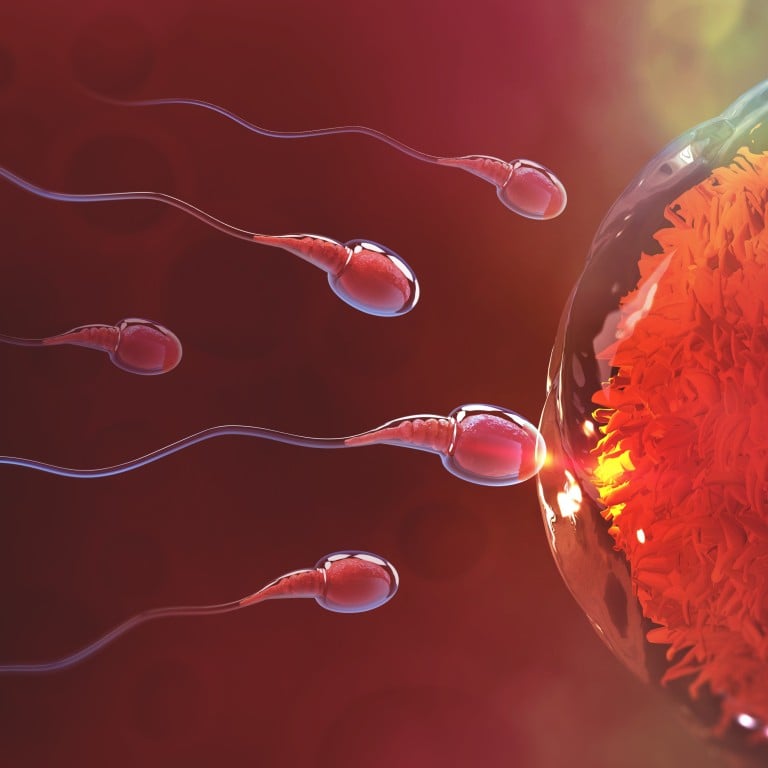
Cannot get pregnant? Male infertility is on the rise, with smoking, stress, obesity, hormones, and alcohol and drug abuse all likely factors, doctors say
- Male infertility is as likely to be what’s stopping a couple conceiving as female infertility. Stress, obesity, low testosterone and smoking are likely causes
- Men need to think about developing healthy sperm months before they plan on trying to father a baby, doctors say. They could also seek help for health problems
Writing on an online forum, Karen is distressed at her inability to conceive. Her anguish is no surprise.
What might be a surprise, though, is that the fertility issues in her case lie not with her, but with her husband.
“I was shocked. I don’t know what to think. I have obviously heard of infertility in women, but men?” Karen wrote.
Infertility affects up to 15 per cent of couples globally. Historically, problems with fertility have been considered to lie with women. That male infertility accounts for up to 50 per cent of all infertility cases is not so widely known.

Men themselves are reluctant to address their fertility for fear of feeling emasculated.
Professor Richard Pilsner’s laboratory at Wayne State University School of Medicine in Detroit, in the US state of Michigan, focuses on taking a paternal perspective to reproductive health by seeking to understand the role of sperm.
‘Ticking time bomb’: Taiwan’s fertility rate to become world’s lowest by 2035
Pilsner says: “The burden of reproductive success has largely fallen on women because they are bearing the babies.”
However, he says there is a “paradigm shift in which we recognise that reproductive success is couple-dependent. Research on men has been the missing piece of the puzzle.”

Many of the factors that compromise female fertility affect men, including lifestyle factors. Dr Neel Parekh, a male infertility and men’s health specialist in the department of urology at the Cleveland Clinic in the US state of Ohio, stresses the strong association between male infertility and health.
Pilsner says men need to be thinking about developing healthy sperm long before they think about fathering a baby. “They have an environmental responsibility and it occurs around three months before conception, the time it takes sperm to fully mature.”
Someone who smokes may have sperm cells that are biologically older than sperm from non-smokers
Men have a lower chance of conceiving naturally over 40. Age can affect sperm DNA, which influences sperm count (low sperm count is the cause of about 90 per cent of male fertility issues), sperm motility (the ability of sperm to move efficiently through a woman’s reproductive tract to fertilise her egg), and morphology – shape.
Pilsner stresses that it’s not so much the biological age of a man that counts, it’s the epigenetic age of his sperm. Epigenetics describes the age of cells. Smoking, for example, can affect that.
“Someone who smokes may have sperm cells that are biologically older than sperm from non-smokers,” he says. Sperm epigenetic ageing, he says, is a much better measure of overall sperm fitness.
How men can keep their sperm healthy: great sex, cold baths, garlic
According to the Mayo Clinic in Rochester, in the US state of Minnesota, a healthy sperm count is between 15 million and 200 million sperm per ml of semen. If it is below 15 million, a man is diagnosed with low sperm count.
Motility is measured according to how many sperm reach an egg on time; anything above 40 per cent is normal. The higher the percentage, the more sperm can swim to the egg and the greater the chance of fertilisation.
Globally, the quality of sperm is on the wane. Professor Gabriel Chodick, from the Sackler Faculty of Medicine at Tel-Aviv University in Israel, says this may be in part because levels of the male hormone testosterone have been declining among adolescent and adult males in recent years.

One factor could be an increase in waistlines. “Higher BMI [body mass index] was found to be a predictor of declining testosterone and some of that is probably due to increasing rates of obesity.”

The use of anabolic steroids can cause the testes to shrink and can inhibit the production of hormones that play a key role in driving male fertility. One study noted the difference in sperm health between men who used anabolic steroids and men who did not; bodybuilders were nearly five times more likely to have suboptimal semen.
Dr Wong Ching-yin, a senior doctor at the FPAHK, advises men to keep their testicles cool. Studies have found high temperatures may reduce sperm concentration and motility by as much as half.
For a couple trying to conceive, the FPAHK advises having “regular intercourse, two to three times a week, with a slight increase – once every two days – around ovulation”. Less frequent sex, less than once a week, may lower sperm’s motility; too frequent sex may cause sperm numbers to drop.
Sperm: we crunch the numbers and learn how to optimise production
In response to Karen’s online plea, a reader responds: “I’m sorry, what a hard diagnosis. I know stuff can fluctuate with guys a bit. It might be worth having him see a urologist.”
A sensible first step. Men are notoriously bad about seeking help for health conditions, especially intimate problems. They should take heart, though: tests for male infertility are much less invasive than they are for women and begin with simple tests on a semen sample.
5 ways to protect male fertility

1. Don’t smoke
Cigarette smoke contains many harmful chemicals that cause damage to most parts of the body, including sperm.
A study of 715 men found that men who smoked had lower sperm motility than those who didn’t.
Heavy smokers make fewer sperm than non-smokers and smoking can increase the number of abnormally shaped sperm.
Phallus and fallacy: everything important about the penis explained
2. Be mindful of your BMI
Being overweight doesn’t just risk affecting a man’s confidence and interest in sex, it can cause erectile dysfunction and negatively impact sperm motility.
It can also trigger high levels of leptin, a hormone found in body fat which can affect testosterone and sperm health. Even losing a few kilos can improve sperm quality.

3. Keep cool
Saunas, hot showers and baths can arrest sperm development and even suppress the healthy function of sperm-producing cells. Wear cool, loose, cotton underwear, as tight-fitting underwear can compromise sperm’s development, health and motility.
4. Eat healthily and avoid fast food
Covid-19 infection could affect male fertility: University of Hong Kong study
5. Forgo drugs and limit alcohol
Be aware that all sorts of drugs affect sex drive and sperm quantity and quality, including prescription drugs such as opiates and antidepressants. Illicit drugs, including marijuana, can have a detrimental effect.
Using bodybuilding steroids can have a long-lasting impact; it can take two years for sperm to return to normal after stopping steroids.
Drinking alcohol can reduce testosterone production, and hasten the rate at which testosterone is cleared from the system.

